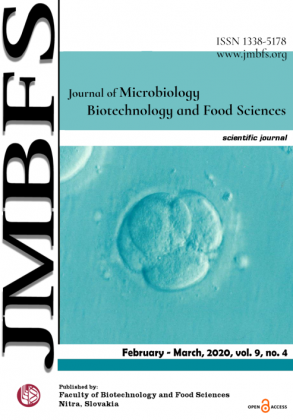EVALUATION OF THE FATTY ACID DESATURASE 3 GENES STABILITY IN FLAX SEEDS HARVESTED FROM RADIO-CONTAMINATED AREA NEAR CHERNOBYL
DOI:
https://doi.org/10.15414/jmbfs.2020.9.4.816-819Keywords:
Chernobyl, FAD3A, FAD3B, restriction analysis, direct sequencingAbstract
Environment around Chernobyl recoveres from nuclear accident in 1986 and provides a base for plant adaptation research. Here, the initial platform was established for molecular screening of flax genome affected by radioactive contamination. Flax (Linum usitatissimum L.) cultivated in the radio-contaminated, and remediated experimental field near Chernobyl was investigated. Specifically, two gene isoforms of FAD3 gene, FAD3A and FAD3B, were evaluated using the restriction analysis, and direct sequencing. The aim of the presented study was to identify mutations, and single nucleotide polymorphisms within the FAD3A and FAD3B genes. The investigation was performed more than 25 years after Chernobyl accident. Therefore, the effect of chronic low dose rate irradiation on flax plants was considered.Downloads
Download data is not yet available.
Downloads
Published
2020-02-03
How to Cite
Lancíková, V., & Žiarovská, J. (2020). EVALUATION OF THE FATTY ACID DESATURASE 3 GENES STABILITY IN FLAX SEEDS HARVESTED FROM RADIO-CONTAMINATED AREA NEAR CHERNOBYL . Journal of Microbiology, Biotechnology and Food Sciences, 9(4), 816–819. https://doi.org/10.15414/jmbfs.2020.9.4.816-819
Issue
Section
Biotechnology
License
Copyright (c) 2020 Veronika LancÃková, Jana Žiarovská

This work is licensed under a Creative Commons Attribution 4.0 International License.
All papers published in the Journal of Microbiology, Biotechnology and Food Sciences are published under a CC-BY licence (CC-BY 4.0). Published materials can be shared (copy and redistribute the material in any medium or format) and adapted (remix, transform, and build upon the material for any purpose, even commercially) with specifying the author(s).





